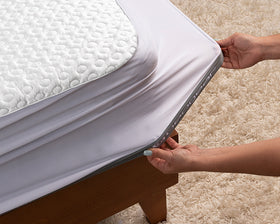888-996-9890

How Important is Sleep for Children?
Everyone Needs a Good Night’s Rest- Especially Children
Quality sleep is important for everyone, but it’s even more crucial for children, adolescents, and teens. In fact, sleep is a critical building block for a child’s mental and physical health. While it can be difficult to get toddlers, and even teens, to get the sleep they need, there are important reasons to keep at it. The American Academy of Pediatrics estimates that sleep issues affect 25 to 50% of kids and 40% of adolescents.
Understanding your kid’s sleep needs is the first step to provide them with a better sleep experience. Through a combination of sleep hygiene, age-appropriate bedtime routines, and attention for any possible sleep disorders, you can help your kid get their important Zzzs, which will help them to be their best when they’re awake.
Why is Sleep Important for Children?
Sleep plays a vital role in the development of young bodies and minds. Research shows that sleep can directly impact a child’s happiness, alertness and attention span, mental performance, mood, resiliency, ability to learn new words, overall learning, and memory. Sleep is also crucially important to growth, particularly in early infancy. For toddlers, napping looks to be required for consolidating memories in the brain, executive attention, and motor skill development.
Sleep is an imperative part of everyone’s routine and a necessary part of a healthful lifestyle. When kids get the sleep they need, they are shown to have better attention spans, behavior, learning, memory, and general mental and physical health. Poor or not enough sleep can cause high blood pressure, obesity, and depression.
What is the Suggested Amount of Sleep a Child Get?
The American Academy of Pediatrics advises the following amounts of sleep based on the age of the child in question:
- Infants (under 1 year): 12-16 hours
- Children 1-2 years old: 11-14 hours
- Children 3-5 years old: 10-13 hours
- Children 6-12 years old: 9-12 hours
- Teenagers 13-18 years old: 8-10 hours
What Happens When Children Don’t Get Enough Sleep?
Nearly every parent can attest to the fact that their child becomes grumpy or hyperactive, with effects that seem similar to ADHD when they don’t get enough sleep. A tired child or teen can have trouble paying attention and that can be a big problem during school. Even a small amount of sleep deprivation can have effects on your kid’s day-to-day life.
According to the American Academy of Pediatrics, 25% of children under five don’t get enough sleep. This is troubling because inadequate sleep in early childhood has been associated with allergic rhinitis and problems with the immune system, in addition to anxiety and depression. There is also developing evidence that inadequate sleep in childhood can increase future cardiovascular risks in the form of obesity, diabetes, and high blood pressure.
In adolescents, not enough sleep can have long-term effects on their schoolwork and mental health. The American Medical Association, the US Department of Health and Human Services, and the American Academy of Pediatrics acknowledge chronic sleep loss in adolescents as a public health problem. It’s a risk factor for substance abuse and mental health conditions in addition to an increased risk for car crashes and sports injuries.
Tips on How to Make Sure Your Child Gets a Full Night’s Sleep
Sleep requirements vary as your child gets older, but whether you’re dealing with a two-year-old toddler or a stubborn teenager, studies suggest that a regular bedtime routine is important for making sure your child gets enough sleep. Whatever activities you decide to use, try to do the same ones each day in the same order so that your kids know what to expect.
Sleep Tips for Babies
Because they have yet to develop a circadian rhythm (hello waking up at three in the morning), very young babies typically do not sleep through the night, and that’s totally alright.
When they wake up, do your regular check of wet diaper or hungry belly to determine what they need. When you’re feeding them or changing them, try to do so quickly and quietly with as little jostling as possible and using only a nightlight if possible. Then, calmly put them down in their crib or bassinet and if they’re not sleeping in your room, leave them to sleep.
If they don’t seem to be able to fall back asleep naturally, try soothing them by quietly talking to them or smoothing over their skin with a gentle touch, without picking them up.
Sleep Tips for Toddlers
Young toddlers typically sleep the majority of the required time at night with one to two naps. Toddler sleep issues can be compounded by separation anxiety and a fear of missing out, which can mean that they try stalling and can be very stubborn at bedtime. You can help some of this by making them feel involved and providing time to wind down. Let them pick which pajamas to wear or which book to read.
Do your best to be patient and remember that they aren’t doing any of this to be mean or rude. They’re just having fun being awake and don’t want it to end. Commit to a bedtime that you stick to every day, and if you’re having issues don’t break the bedtime routine just to make them happy. Try distraction techniques like pulling out a different book to read or choosing a stuffed animal or cuddly to talk them to bed.
Some toddlers make bedtime a bit of a hassle (see my three-year-old) and others have issues with staying asleep. Establishing a consistent bedtime routine will really help this. The night will feel familiar and like an “of course this is next.” The routine should ideally start at the same time each night. As it’s approaching that bedtime you’ve set, start to “wind down” the household.
- Dim the lights
- Turn off the electronics/screens at least an hour before bed
- Limit sugary juices or snacks
- Try for a warm bath
- Do a quiet family activity, like reading some books, in their room where there are fewer distractions
- Don’t keep loud, light-up toys in their bedroom. Try to make their room as much about sleep as you should yours
- If your child wakes up during the night, walk them back to their room with as little commotion as possible
- Set a wake-up time for when the child is allowed to leave his or her room. The child can play quietly until that time if desired
Sleep Tips for Kids
That stage between toddler and regular student can be a challenging one. Just with younger kids, a routine is so incredibly helpful. A typical bedtime routine might include:
- Turning off computers, TV screens, video games, and other bright lights
- Putting on pajamas and brushing teeth
- Reading some books, singing a lullaby, or taking a bath
- Picking a stuffed animal for the night
The best time to put your kid, or even infant, to bed is when they’re acting sleepy, not when they’re already asleep. This helps them learn how to fall asleep without you soothing them and helps them to associate the same time of night with getting to sleep. If preschool children wake up in the middle of the night, walk them back to their bed and tuck them back in.
If a nightmare was to blame and they’re upset, try talking to them in a calm, happy way. “It’s okay honey. Let’s just climb back in bed.” Making too big a deal out of the nightmare can make it worse. You can also try listing funny or happy things that they can think about instead for a minute or two and then say goodnight and leave once more.
Daytime habits also affect sleep. You can promote restful sleep by following these sleep hygiene rules:
- Providing a well-balanced schedule with sprinkled in periods of rest and play
- Sticking to a regular bedtime
- Making the bedroom, and particularly the mattress, a no-screen zone, even during the day
- Giving them a healthy diet
- Choosing a cooler temperature at night
- Using curtains to block out light with a nightlight if they’re scared of the dark
- Making the bedroom a quiet place with just a white-noise or gentle-music machine playing in the background
- Avoiding caffeine, large meals, and sugary treats prior to bed, choosing a healthy bedtime snack if needed instead
It’s important to provide your child with the time and chance for regular exercise, but don’t fall into the trap of exhausting them before bed so that they sleep better. More often than not, it actually makes them overtired and can even make it harder for them to fall asleep. Figure out what your unique child is like when they get overtired so that you can get them in bed to avoid that.
A bedtime routine can be easier said than done too. For single parents, parents of multiple kids, and those who have siblings sharing a room, it can be quite a challenge. It can even be tricky if your kid just happens to be more stubborn than others about bedtime. The National Sleep Foundation has a list of additional sleep strategies that you can try right on their website for even more help.
Sleep Tips for School Kids
Between academic, social, and extracurricular commitments, school-age children frequently have hectic schedules that can make it tough to get a good night’s sleep or stick to a routine. Wherever possible, following a consistent schedule and having time to wind-down before bed will really help. In fact, these recommendations are still true for adults. Routines, making the bedroom about sleep, and having wind-down time are super helpful for mom and dad too.
If you’re practicing healthy sleep hygiene and your child is still having trouble falling asleep or staying asleep at night, you may want to visit your doctor to see if they have a sleep disorder. You can also ask their teacher to keep you updated on how they are doing in school. Difficulty concentrating, hyperactive behavior, and learning problems can indicate they aren’t getting enough sleep.
Sleep Tips for Teenagers
Teenagers are programmed to have a later circadian rhythm, which can create a problem with school start times. Firstly, honor the increased demands on their time. Teens take on a lot during the day and high school is very similar to a full-time job. Secondly, work together with them to find a healthy sleep schedule that works for their needs. Thirdly, be a good example. Often unknowingly to the whole house, teens imitate their parents’ or guardians’ sleep habits. Show them how it’s done by practicing what you preach.
The morning is important, too. Even though everyone wants to sleep in on the weekend, it can be better to stick to bedtime and wake-up time seven days a week. Things come up of course but make the effort. If you notice that they seem stretched too thin and are staying up too late, work with them to cut back on some of those extracurricular activities or at least how many they do in a day.
Helping Your Teen Get the Best Sleep with a Good Mattress
Teen bodies aren’t kids’ bodies. They are bigger, work harder (especially if the teen is in sports), and are going through a number of important changes. To ensure your teen gets the sleep they need, be sure to replace any mattress they may have been using as a child with a new. Chances are that mattress was not meant for a near-adult body and doesn’t take into account how your teen falls asleep.
Do they sleep on their side, back, or stomach? Are they physically active quite a lot and need something that can help to support their spines and joints? Are they already dealing with sleep issues like snoring, nighttime heartburn, chronic congestion, chronic pain from an injury or accident, etc.? If your kid is dealing with any of these things, the same basics apply to buying them a mattress as it would for you.
We have excellent starter models that still provide support and comfort without having to break the bank (college is just around the corner after all). You can take a peek at some of our customer-favorite intro mattresses from Malouf here and from Sealy here.
Finished With Your Research?
If you're ready to shop, check out our wide selection of mattresses from top brands to decide what will work for your budget and your child. If you still need assistance with choosing a mattress for their unique needs, check out our Mattresses Buying Guide here.
And don’t forget about checking out the other helpful content in our Better Sleep Blog here. It can help you to learn more about sleeping better, what position is best for an individual, and how your health conditions can help decide what bed and position are best for sleeping.
Picking out a mattress is a big deal and can greatly impact your child’s sleep quality and how well they do throughout the day. Get the help you need to make the best decision to ensure they are always well-rested and ready for anything from BedPlanet.Com.





